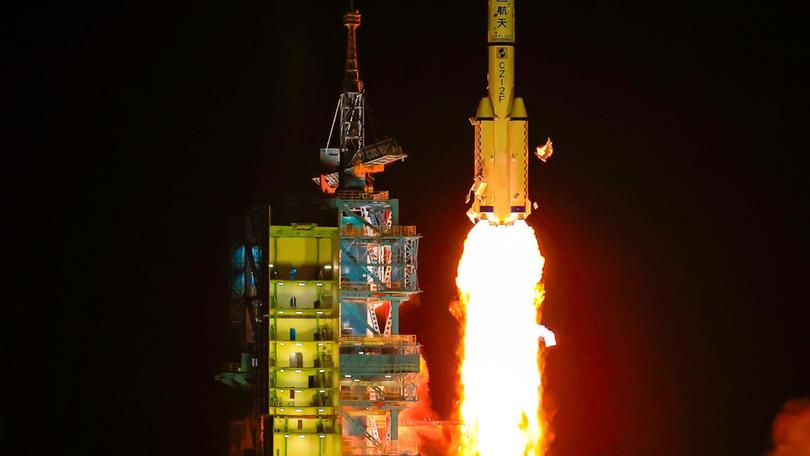China launches new crew to Tiangong space station as it seeks to expand exploration
The team of two men and one woman will replace the astronauts who have lived on the Tiangong space station for the last six months.

China declared a “complete success” after it launched a new three-person crew to its orbiting space station early Wednesday as the country seeks to expand its exploration of outer space with missions to the moon and beyond.
The Shenzhou-19 spaceship carrying the trio blasted off from the Jiuquan Satellite Launch Center in northwest China at 4.27am, local time, atop a Long March-2F rocket, the backbone of China’s crewed space missions.
“The crew condition is good and the launch has been successful,” the state broadcaster China Central Television announced.
Sign up to The Nightly's newsletters.
Get the first look at the digital newspaper, curated daily stories and breaking headlines delivered to your inbox.
By continuing you agree to our Terms and Privacy Policy.China built its own space station after being excluded from the International Space Station, mainly because of US concerns over the People’s Liberation Army, the Chinese Communist Party’s military arm’s overall control over the space program. China’s moon program is part of a growing rivalry with the US and others, including Japan and India.
The team of two men and one woman will replace the astronauts who have lived on the Tiangong space station for the last six months. They are expected to stay until April or May of next year.
The new mission commander, Cai Xuzhe, went to space in the Shenzhou-14 mission in 2022, while the other two, Song Lingdong and Wang Haoze, are first-time space travelers, born in the 1990s.
Song was an air force pilot and Wang an engineer with the China Aerospace Science and Technology Corporation. Wang will be the crew’s payload specialist and the third Chinese woman aboard a crewed mission.
Besides putting a space station into orbit, the Chinese space agency has landed an explorer on Mars. It aims to put a person on the moon before 2030, which would make China the second nation after the United States to do so. It also plans to build a research station on the moon and has already transferred rock and soil samples from the little-explored far side of the moon in a global first.
The US still leads in space exploration and plans to land astronauts on the moon for the first time in more than 50 years, though NASA pushed the target date back to 2026 earlier this year.
The new crew will perform spacewalks and install new equipment to protect the station from space debris, some of which was created by China.
According to NASA, large pieces of debris have been created by “satellite explosions and collisions.” China’s firing of a rocket to destroy a redundant weather satellite in 2007 and the “accidental collision of American and Russian communications satellites in 2009 greatly increased the amount of large debris in orbit,” it said.
China’s space authorities say they have measures in place in case their astronauts have to return to Earth earlier.
China launched its first crewed mission in 2003, becoming only the third nation to do so after the former Soviet Union and the United States. The space program is a source of enormous national pride and a hallmark of China’s technological advances over the past two decades.
